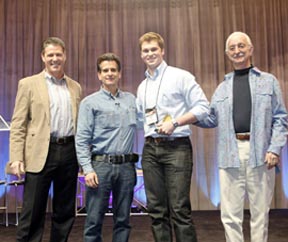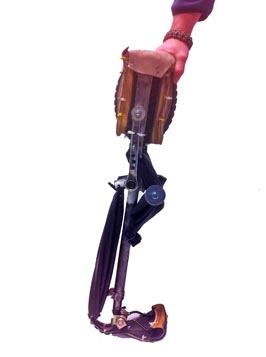Last fall, Parker Owen was a senior at the Alabama School of Math and Science in Mobile, AL, and a member of FIRST Robotics Competition (FRC) team 3469 and FIRST Tech Challenge (FTC) Team 4260. Parker invented a low-cost prosthetic leg that he sees being able to help perhaps thousands of people who can't afford the professional device.
Parker Owen won this year's Future Innovator Award.
This award recognizes creativity in effectively solving a real-world complex problem through the invention of a unique solution beyond the requirements of the FIRST competition season. This award directly links to the FIRST mission to inspire young people to be science and technology leaders and to the FIRST vision to transform the culture by creating a world where science and technology are celebrated. The award is sponsored by the Abbott Fund. See more about FIRST at www.usfirst.org and www.electronicproducts.com/News/You_need_to_know_about_FIRST.aspx?terms=%22You%20need%20to%20know%22).
Last fall, Parker was talking with a friend who had taken mission trips to Honduras. The friend told Parker about the need in Honduras for prosthetic legs, which cost around $10,000 each. Parker went to his FIRST robotics team, and the team started looking at available prosthetics on their computers — all of which were very expensive.

Parker Owen earned the Future Innovator Award sponsored by the Abbott Fund for his invention, the Cycle-Leg. Pictured here (from L to R) are Parker's dad, Scott; Dean Kamen, founder of FIRST; Parker Owen; and Dr. Woodie Flowers, chairman of the FIRST Advisory Board.
Parker was thinking about this and then watched a few videos of “third world countries” on his computer. He noticed there were bicycles everywhere. “After staring at a bicycle diagram for a few hours, I had an idea in my head about how the parts might fit together,” he told me. The following Saturday afternoon he went to a thrift store and bought a $20 bike. He took it home to his dad's shop and tore it apart. He then put various parts together in the form of a prosthetic leg and it came together very well. He decided to use the bike's inner tube as a pneumatic actuator to adjust the fit for different size people and to allow the wearer to adjust it as his/her body and strength may change. It seemed to work.
His friend Greg knew of a prosthetic expert in the next town. This expert had been part of the Honduras trips, and Parker called him and then took his new device over to show him. Very impressed, the expert agreed to advise Parker on getting some of the details in place.

Parker Owen's invention, the Cycle-Leg.
Parker went to Honduras with a prototype, but stiff legal and safety regulations precluded getting the leg in use there. He is now working on getting the documentation and testing done. Patents are in place or in process. He credits FIRST with giving him the perspective and enthusiasm needed for ideas such as this.
Advertisement
Learn more about Electronic Products Magazine





